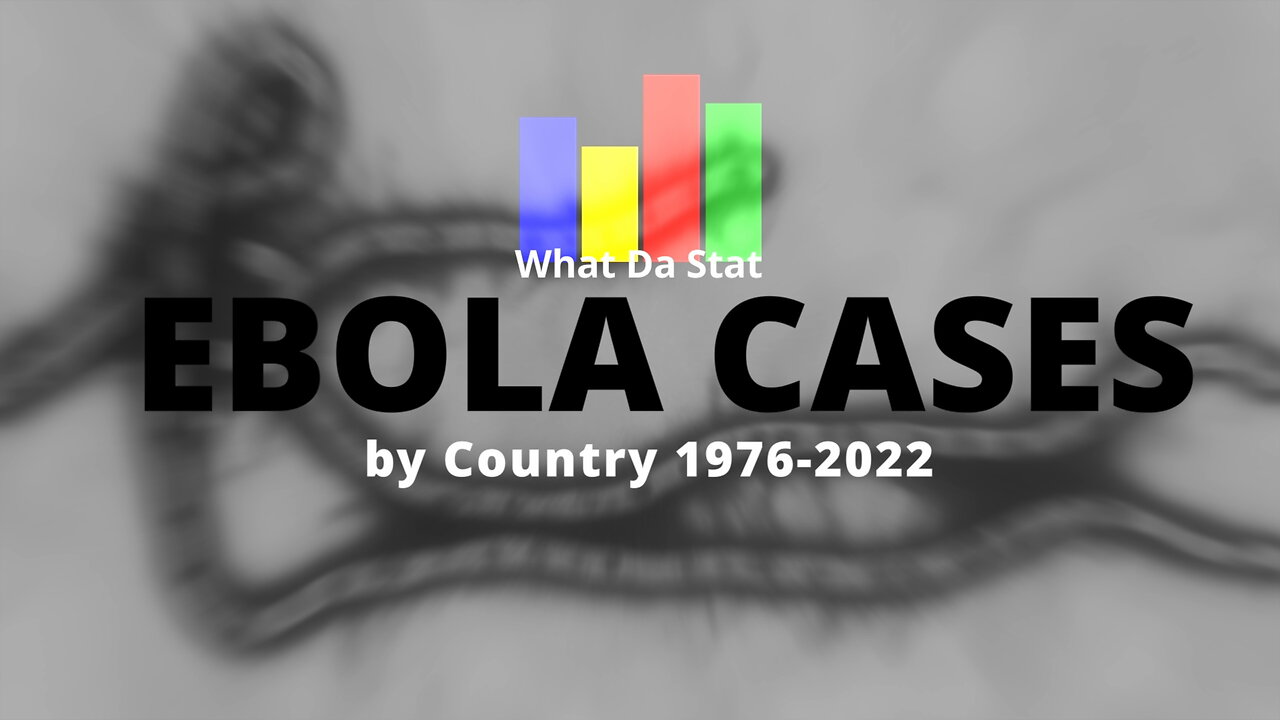Premium Only Content

Ebola Cases and Deaths by Country and World 1976-2022
This video shows the accumulated number of confirmed Ebola cases, deaths and case fatality rate (CFR) by country and world from the first identification in 1976 to 2022.
Years without confirmed cases are skipped.
Since the numbers are based on confirmed cases, and not all countries have reported in the past, the actual numbers may be much higher.
In this video, the numbers are also based on statistics from outbreaks and epidemics which could span over 2 or 3 years. In such cases, the numbers are equal spread on those years.
Zaire ebolavirus, Sudan ebolavirus, Taï Forest ebolavirus and Bundibugyo ebolavirus is included. Reston ebolavirus, which does not cause illness in people, is excluded here.
Some few cases outside the African regions are usually the result of medical evacuations or laboratory accidents.
Ebola virus disease (EVD), commonly known as Ebola, is a severe and often deadly illness caused by the Ebola virus. Since its discovery in 1976, Ebola has sporadically emerged in different parts of Africa, resulting in significant outbreaks and causing global concern.
Some highlights:
1976-1990s: The Ebola virus was first identified in 1976 in two simultaneous outbreaks, one in Sudan and the other in what is now the Democratic Republic of Congo. These initial outbreaks resulted in high fatality rates, reaching up to 88%. However, due to limited international travel and isolated affected areas, the impact of Ebola remained relatively contained within the affected regions.
2000s: From the 2000s, Ebola outbreaks became more frequent, with several countries in Africa experiencing sporadic cases. In 2000, Uganda faced a large outbreak, and in 2003, the virus reemerged in Congo, causing hundreds of deaths. The world began to take notice of Ebola's potential to spread beyond local communities, and efforts to contain the virus became more urgent.
2014-2016: The most significant Ebola outbreak to date occurred in West Africa from 2014 to 2016, primarily affecting Guinea, Sierra Leone, and Liberia. This outbreak highlighted the interconnectedness of our globalized world as the virus spread across borders, reaching urban centers and resulting in many cases and deaths. The key factors contributing to the severity of the West African outbreak were weak healthcare infrastructure, inadequate resources, and insufficient public health measures. The World Health Organization (WHO), along with various international partners, mobilized to control the spread, strengthen healthcare systems, and develop effective vaccines and treatments.
2018-Present: Since the West African outbreak, efforts have been made to improve preparedness and response to Ebola outbreaks. The development and deployment of experimental vaccines, such as rVSV-ZEBOV, have shown promising results in preventing and reducing the severity of the disease. However, new outbreaks have occurred sporadically. In 2018, the Democratic Republic of Congo faced a significant outbreak, and in 2021, another outbreak was reported in Guinea. Prompt responses and collaboration between local communities, national governments, and international organizations have been crucial in containing these outbreaks and minimizing their impact.
Ebola virus disease, with its high fatality rates and potential for rapid spread, has remained a significant global health concern since its discovery in 1976. While progress has been made in improving preparedness, response, and medical interventions, continued efforts are needed to prevent future outbreaks and strengthen healthcare systems in affected regions.
Collaboration between nations, investments in healthcare infrastructure, and public awareness are key to minimizing the impact of Ebola and ensuring a swift and effective response when outbreaks occur. By learning from past experiences and applying lessons learned, we can work towards a future where Ebola is no longer a threat to global health security.
Music:
Solas Composer - Axe Bearer
https://soundcloud.com/solas_composer/axe-bearer
Data visualization created with flourish.studio
-
 1:22:57
1:22:57
Tucker Carlson
5 hours agoNancy Pelosi Stock Tracker Chris Josephs: How to Get Rich by Investing Like a Politician
88.4K38 -
 2:59:34
2:59:34
Barry Cunningham
5 hours agoWATCH LIVE: DOGE SUBCOMMITTEE HEARING!
22.4K19 -
 1:29:32
1:29:32
Simply Bitcoin
4 hours ago $1.74 earnedNEW REPORT PROVES This Bitcoin Bull Run is DIFFERENT!! | EP 1191
24.8K -
 1:23:50
1:23:50
Russell Brand
5 hours agoAI Visions, War Deals, and the Next Big Lockdown? – SF544
97.5K16 -
 1:18:31
1:18:31
vivafrei
6 hours agoCanadian Liberal Leadership Race TO THE BOTTOM! Florida Prosecutor Claims SELF DEFENSE? & MORE!
39.4K25 -
 3:08:48
3:08:48
Right Side Broadcasting Network
7 hours agoLIVE REPLAY: President Trump Participates in First Cabinet Meeting - 2/26/25
103K28 -
 1:57:29
1:57:29
The Charlie Kirk Show
3 hours agoJudges vs. The People + Is DOGE Enough? + Fort Knox | Rep. Roy, Glenn, Plume, Posobiec | 2.26.2025
74.1K14 -
 2:39:35
2:39:35
The White House
5 hours agoPresident Trump Hosts First Cabinet Meeting, Feb. 26, 2025”
53.9K42 -
 58:16
58:16
The Dan Bongino Show
6 hours agoShake-Up In The White House Press Room (Ep. 2431) - 02/26/2025
846K1.14K -
 1:00:00
1:00:00
The Rubin Report
4 hours agoDem Looks Visibly Angry as Stephen A. Smith Points Out Failures to His Face
74.1K55